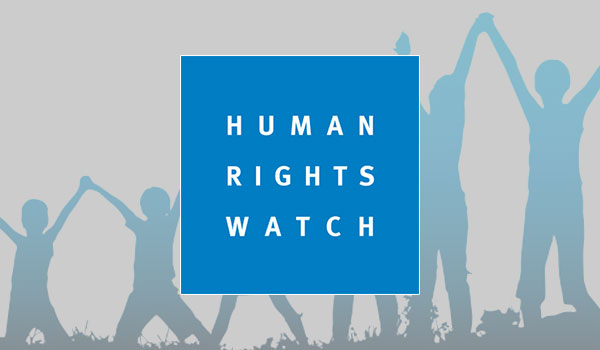Little action by Sri Lanka on promised justice, reforms: HRW

The Sri Lankan government should announce a time-bound plan to carry out its pledges to the United Nations Human Rights Council since October 2015, Human Rights Watch said today.
At an interim update before the Council this week on progress towards fulfilment of its human rights commitments, UN member countries should press Sri Lanka to ensure justice and accountability for the tens of thousands of victims of the country’s civil war.
In October 2015, the Human Rights Council adopted Resolution 30/1 by consensus in which Sri Lanka pledged to set up four transitional justice mechanisms to promote “justice, reconciliation and human rights” in the country.
These included an accountability mechanism involving international judges, prosecutors, and investigators; a truth and reconciliation mechanism; an office of missing persons; and an office for reparations.
Thus far only the Office of Missing Persons (OMP) has been set up – just ahead of the current session in Geneva. The high commissioner for human rights, in a report to the Council, expressed similar concerns. The Council will discuss the high commissioner’s report this week.
“The Human Rights Council needs to make it clear to the Sri Lankan government that it expects it to stop playing games and start delivering on its commitments,” said John Fisher, Geneva director. “The Sri Lankan government needs to move beyond pre-session PR and present a meaningful and concrete plan to deliver results for the victims who have been awaiting justice for far too long.”
Human Rights Watch welcomed the December action by the government to accede to the Optional Protocol to the Convention against Torture (OPCAT).
Creating the Office of Missing Persons, while a positive step, is just the latest body set up in Sri Lanka to look into enforced disappearances. Reports of prior government-established commissions, some of which have been made public in recent years, have not led to accountability.
“The Office of Missing Persons now represents their last best hope to learn the fate of their loved ones,” said Fisher. “It must do its work quickly and properly. Families of the disappeared have appeared before commission after commission, and many have camped out in the open over the past year in protest of government inaction.”
The justice and accountability mechanism in the 2015 resolution is a key demand from victims and families affected by Sri Lanka’s 27-year civil war between the government and the separatist Liberation Tigers of Tamil Eelam. Both sides to the conflict, which ended in May 2009 with a decisive government victory, committed serious human rights abuses and violations of international humanitarian law, including extrajudicial killings, deliberate and indiscriminate attacks against civilians, enforced disappearances, and torture.
The government should publicly set out when this mechanism will be set up instead of hiding behind various politically expedient excuses, Human Rights Watch said.
The government has also failed to deliver on its other pledges under the 2015 resolution. A government-commissioned task force led by independent activists carried out a nationwide consultation down to the grass-roots level and delivered a detailed report on the expectations of victims and affected communities.
However, the report and its recommendations have languished and it is unclear whether the government will take them into account in either the Office of Missing Persons or the other transitional justice mechanisms.
Another key outstanding pledge, namely security sector reform including the repeal of the draconian Prevention of Terrorism Act (PTA), also remains unfulfilled. Sri Lanka has a long history of abuses by security forces, both during and after the civil war. The security forces have long used the PTA to detain suspects for years without charge, facilitating torture and other mistreatment. The government’s claims to be working on repealing and replacing the PTA with a rights-respecting law have yet to come to fruition.
Sri Lanka’s state of emergency laws and regulations under the Public Security Ordinance (PSO) create a legal framework for abuse by the security forces in the name of national security interests.
The government recently resorted to emergency rule in response to anti-Muslim riots in the Kandy district. The government was largely successful in quelling the riots, arresting dozens of people suspected of instigating and participating in the violence, but the episode highlighted the lack of action in limiting the PSO’s broad powers. The government had pledged to review these regulations under Resolution 30/1 but they still permit the authorities to detain people for up to 14 days before being produced in court.
“A lack of justice and impunity for past abuses fuels current abuses in Sri Lanka,” Fisher said. “The government’s delay in undertaking promised reforms is a slap in the face to the victims and their families who have waited for years for answers. The government should stop hiding behind politically expedient excuses and act on its pledges,” it said.
(Source: Daily Mirror)
Latest Headlines in Sri Lanka
- Sri Lanka declares essential services to ensure recovery after Cyclone Ditwah January 31, 2026
- Sri Lanka disburses Rs. 50,000 relief to 70% of Cyclone Ditwah victims January 31, 2026
- Sri Lanka to launch national review on social media’s impact on children January 30, 2026
- Sri Lanka, Saudi Arabia move to boost industrial cooperation January 30, 2026
- Johnston Fernando, two sons and others further remanded until February 13, 2026 January 30, 2026


